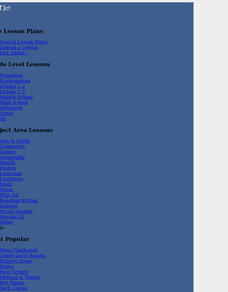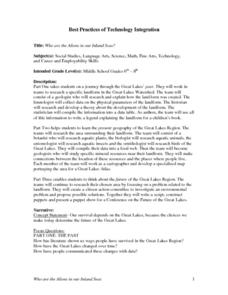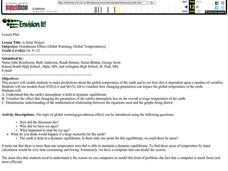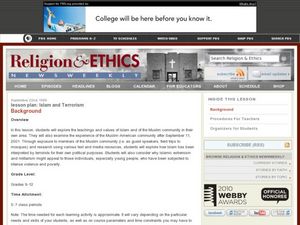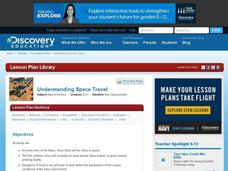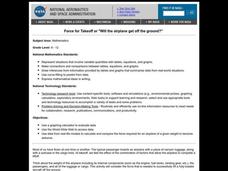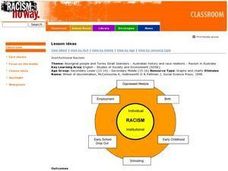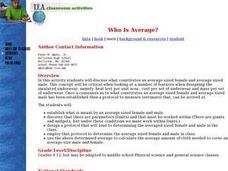Curated OER
Surface area of a cylinder
Students construct a cylinder made of paper with detachable bases. Then they are taught the formulas for finding the area of a curved surface and the total surface area of a cylinder. A great hands-on approach!
Curated OER
The Ultimate Classroom: R & D
Redecorate a classroom on a budget. Middle schoolers rebuild a classroom after a disaster. They conduct Internet research to determine construction supplies needed and the most cost effective way to reach the predetermined results. They...
Curated OER
Using Abiotic and Biotic Parameters to Monitor Air Quality
Students identify the abiotic factors that influence a river or stream and the organisms that live in it. They measure several abiotic and biotic parameters to gauge water quality. Students examine the biotic environment by identifying...
Curated OER
Wing Area Effects Problem Set
High schoolers read an explanation from a NASA Web-based textbook on lift and an explanation on the FoilSim software package given below. They use FoilSim to evaluate the relationship between wing area and lift.
Curated OER
The Math in the Design and Building of Bridges
Research various types of bridge designs. Your class will be asked to consider what it would be like without bridges while learning about how they work. They will construct a model bridge based on given parameters. They then calculate...
Curated OER
Who Are the Aliens in Our Inland Seas?
Students work in teams to research specific landforms in Great Lakes Watershed, compile information into data table, and write legend explaining landform for children's book. Students then research area surrounding landform, compile...
Curated OER
A Solar Project
High schoolers make predictions about the global temperature of the earth and to see how this is dependent upon a number of variables. Students visualize how changing parameters can impact the global temperature of the earth.
Curated OER
The Fabled Maine Winter
Learners graph and analyze scientific data. In this research lesson plan students use the Internet to obtain data then draw conclusions about what they found.
Teach Engineering
Adapatations for Bird Flight - Inspiration for Aeronautical Engineering
It's a bird, it's a ... device made to mimic birds. The eighth installment of a nine-part module has pupils read various articles to learn about bird flight. They consider the implications for aeronautical engineering.
Curated OER
Islam and Terrorism
Young scholars explore Muslim beliefs. In this Muslim extremist instructional activity, students research Internet and print sources regarding Muslim beliefs and examine how Muslim extremists have interpreted the tenets of the religion...
Curated OER
Understanding Space Travel
Students study the unique environment of the moon and Mars. In this space science lesson plan, students design a city located in the outer space. They create a computer aided design, models or drawings of their cities and share them with...
Curated OER
Math: Will The Airplane Get Off the Ground?
Students use data from real-life models to calculate and compare the force required for an airplane of a given weight to become airborne. They use a graphing calculator to evaluate data and use the World Wide Web to access data.
Curated OER
Actual Airflow vs. Ideal Airflow: Stalls
Students use 3-D modeling techniques to observe the characteristic signature of the stall condition apparent on an airfoil at high angles of attack. They use FoilSim to compare the above with ideal airflow.
Curated OER
Institutional Racism
Students define institutional racism and consider its effects on various groups in society. They discuss what other groups besides Indigenous Australians have experienced institutional racism in Australia? Students research...
Curated OER
Using 3-D Models for Code Validation with FoilSim
Students use FoilSim to complete the activity to create tables of data sets comparing the lift values for a 3-D model of a symmetrical wing section to the values predicted by the FoilSim software.
Curated OER
Who Is Average?
High schoolers investigate the average sizes for males and females. They discuss averages in relation to the amount of material needed to make underwear. In teams, they create a data table of small, medium, and large sizes and calculate...


